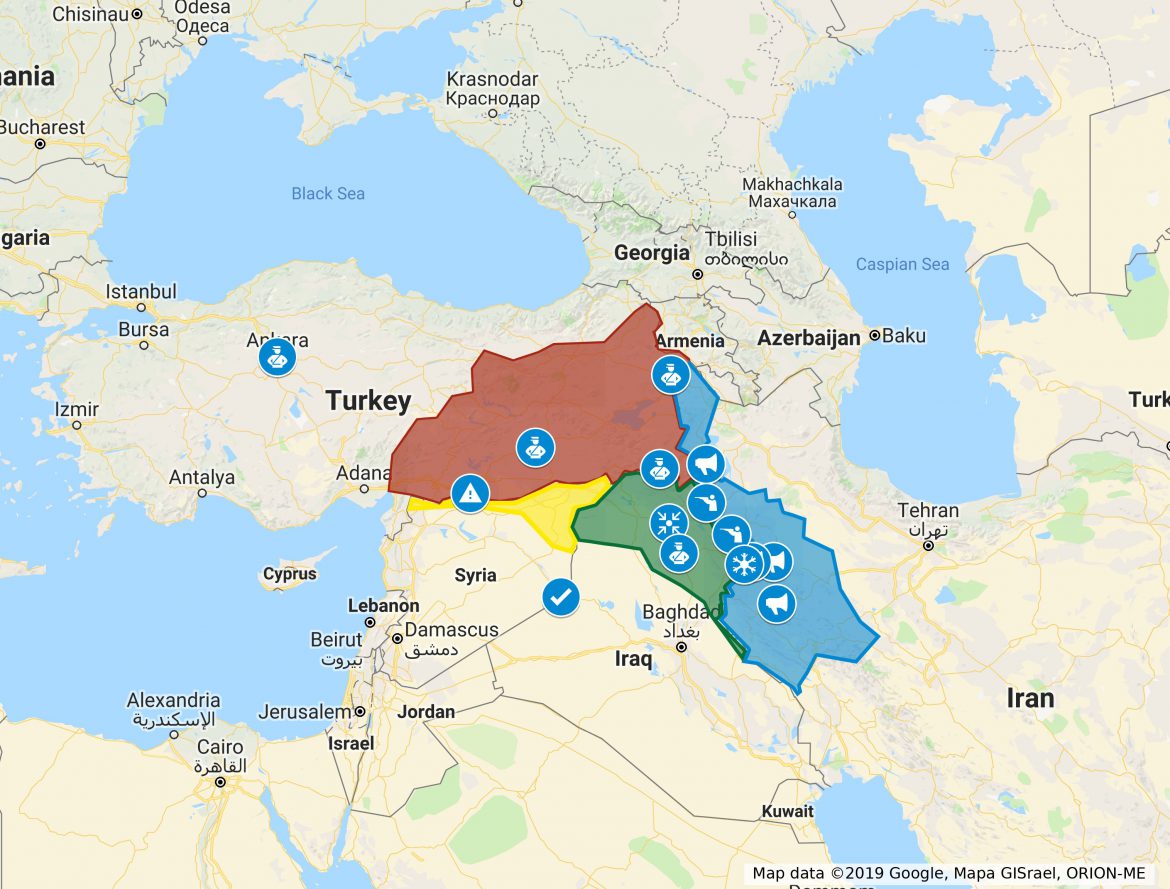1.7K
A weekly brief of events that occurred in the Kurdish regions of Iran, Iraq, Syria, and Turkey.
Iran
- Strikes and protests continue in the Kurdish region of Iran. On February 14, teachers in Sanandaj, Urmia, and Kermanshah cities held protests over unpaid salaries. The protests were held in front of the education department in the cities. In addition to calling for proper payment of their salaries from the Iranian government, the teachers called for the release of political prisoners and the cessation of discriminatory education policies. According to the human rights’ group Kurdistan Association for Human Rights (KMMK), Iranian security officers detained several teachers in Urmia after their participation in the protests. In Sanandaj, a well-known teacher, Mokhtar Assadi, was arrested by Iranian intelligence officers. On Saturday, a group of municipality workers from Sawllawa town held a protest over the Iranian government’s failure to pay staff wages for over two months.
- As Iranian border guards continue to target border porters (Kolbars), the Kolbars death toll reached 12 with 28 wounded since the beginning of 2019. On Saturday, one Kolbar was shot and killed by border guards near Baneh. On Thursday, border guards fired at a group of Kolbars near a border crossing around Piranshahr, resulting in the injury of one Kolbar. Meanwhile, due to cold conditions in Hawramwan region between Iraqi Kurdistan and Iranian Kurdistan, one Kolbar suffered frostbite and was transferred to a hospital in Kermanshah city.
Iraq
- Plans for an agreement between the Democratic Party of Kurdistan (KDP) and the Patriotic Union of Kurdistan (PUK) to form a new government and hold a Parliamentarian session stalled on Monday. The PUK boycotted Monday’s Parliamentary session, which was designed to elect the Parliamentary Presidency (comprising the Speaker, Deputy Speaker, and Secretary of the Parliament). Nor did the KDP and PUK reach a final agreement over the Kirkuk Province issue, with no decision yet made on holding a provincial council meeting and electing a governor. On Monday the Kurdistan region elected its Parliamentary Presidency. The KDP won the Speakership and the Deputy Speaker, a Turkman, won the Secretary of the Parliament. The newly elected Deputy Speaker Hemin Hawrami (KDP) told Rudaw that the Speakership is the share of the PUK and once they participate in the Parliamentary sessions, the KDP Speaker will resign to elect a new PUK Speaker. Meanwhile, after being an opposition party for two Parliamentarian periods (8 years) the Change Party (Gorran) signed an agreement with the KDP to participate in the new government. Thus, Gorran lawmakers participated during the Monday session.
- After six months of imposing customs on goods from the Kurdistan region to Kirkuk, the Iraqi government shut down the two customs checkpoint both between Kirkuk and Arbil as well as Kirkuk and Sulaymaniyah. Both Baghdad and Arbil reached agreements to unify the customs from the border-crossing points between Iraq and Iran as well as Iraq and Turkey.
- The Iraqi Government appointed Abu Thaer al Basheri, a commander from the Iranian-backed militias known as the Popular Mobilization Units (PMU), to become a deputy commander of the military operation for Kirkuk Province. Al Basheri is the commander of the PMU’s 16th division and has been in high coordination with Iranian security figures in Iraq for some time. On October 16, 2017, the Iraqi military and the Iranian-backed PMUs imposed martial law and removed the Kurdish forces from the province.
Syria
- During the Munich Security Conference on February 15, U.S. Senator Lindsey Graham revealed that the U.S. had asked European countries to deploy troops in Syria after the U.S. withdraws from Syria. A senior Kurdish official in Syria, Aldar Khalil, also asked the European powers not to abandon the Kurds after the U.S. withdrawal. In Munich, President Trump’s Envoy for Syria stressed his country’s objection to any plan allowing Assad’s forces to replace U.S. troops in the region. The fear of either a Turkish invasion of Kurdish territory or the control of the Kurdish region by Assad’s forces remains high, especially after reports of the planned complete withdrawal of U.S. troops from Syria by April 2019.
- The U.S.-backed Syrian Democratic Forces are on the verge of declaring the full liberation of ISIS-held areas in Syria after advances made in the last couple week in Bagouz Fouqani. On Sunday, the SDF held a meeting of its leadership and released a statement about its future mission and strategy. The SDF announced that the ISIS Caliphate is ending and the remaining terrorists are holding civilians hostage. The SDF vowed to fight ISIS sleeper cells and voiced its commitment to “drying up the social, intellectual and economic ground which ISIL depends on for the continuity of its existence.” The SDF also stressed its conditions for any dialogue with the Assad regime: “taking into account the specificity of Syria’s democratic forces and the constitutional recognition of self-declared and effective autonomy in the northeast.”
Turkey
- More pressure has been placed on the Peoples’ Democratic Party (HDP), a pro-Kurdish political party, before Turkey’s local election on March 31, 2019. Kurdish activists and HDP members continued their hunger strikes, calling for an end to the solitary confinement of political prisoners such as imprisoned Kurdish leader Abdullah Ocalan. The Turkish Interior Ministry announced the arrest of 735 people in the recent house raids over demonstrations held by Kurds in Turkey. On day 100 of Kurdish politician Leyla Guven’s hunger strike, Turkish police blocked a planned solidarity protest in several Kurdish cities. In Hakkari the police arrested 9 HDP and Kurdish activists. On Friday, a Kurdish lawmaker from Diyarbakir, Saliha Aydeniz, was hospitalized after being brutalized by Turkish police. Turkish law enforcement also detained several protesters in Dogubeyazit District, Agri Province. In violation of the essential democratic principle of freedom of expression, the Turkish courts in Ankara have blocked 317 websites and social media accounts, including ones owned by journalists.

